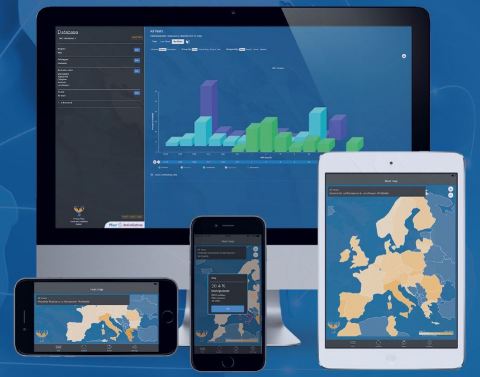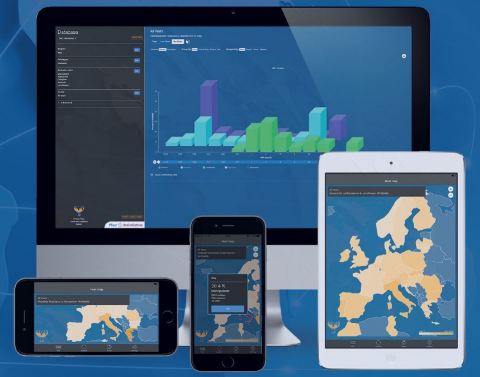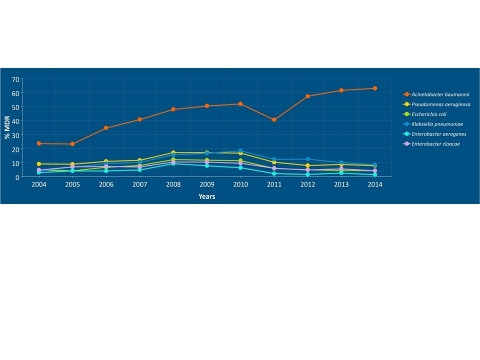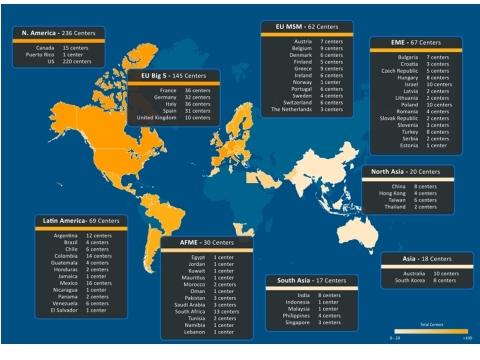NEW YORK--(BUSINESS WIRE)--Pfizer Inc. today announced the launch of the company’s Antimicrobial Testing Leadership and Surveillance (ATLAS) website, which is designed to provide physicians and the global health community with easy access to critical data on the efficacy of various antibiotic treatments and emerging resistance patterns across more than 60 countries. Understanding evolving bacterial resistance patterns is a key element in managing the rise of antimicrobial resistance. To that end, ATLAS can not only help physicians select the most appropriate treatment choices for their patients, but also enable global health authorities to develop data-driven antimicrobial resistance mitigation strategies. Pfizer will formally unveil ATLAS on April 22nd at the annual meeting of the European Congress of Clinical Microbiology and Infectious Disease (ECCMID) in Vienna.
Mobile devices and applications provide many benefits for healthcare professionals including increased access to point of care tools, which have been shown to support better clinical decision making and improved patient outcomes. In response to this need, Pfizer also offers ATLAS as a mobile application to enable rapid access to important resistance information at the point of patient care.
ATLAS offers an interactive platform that enables physicians to evaluate data, conduct analyses, and export tables and figures that include parameters such as pathogen, region, specimen source and in vitro susceptibility data. The ATLAS database is updated every six months with new resistance data from healthcare institutions in more than 60 countries as these become available. ATLAS can be accessed by visiting: www.atlas-surveillance.com.
“An important aspect for physicians when treating patients is knowledge; knowledge of where certain resistant bacterial infections tend to occur and knowledge of which antibiotics remain effective against them,” said Dr. Freda Lewis-Hall, Chief Medical Officer of Pfizer Inc. “ATLAS underscores our continued commitment to providing patients and physicians with meaningful resources that can help ensure appropriate utilization of antibiotics and improve infection prevention and control.”
About Antimicrobial Resistance (AMR)
The World Health Organization (WHO) characterizes antimicrobial resistance as one of the biggest threats to global health, that can affect anyone at any age in any country, threatening our ability to treat serious infections and provide standard medical procedures. Gram-negative bacteria, the cause of many healthcare-associated infections (HAIs), have become increasingly resistant to many available antibiotic treatments. These infections are associated with increased patient mortality and cost of care. At present, approximately 700,000 deaths per year are attributed to antimicrobial resistance globally, with an increase to 10 million predicted by 2050 if no action is taken to address this issue.
About Pfizer’s Commitment to Antimicrobial Resistance:
Today, Pfizer is the leading global provider of anti-infective medicines in the industry, offering patients access to a diverse portfolio of more than 80 products. Pfizer recognizes the serious public health threat associated with AMR and has taken significant steps to address this issue. In early 2016, Pfizer was a signatory of the Declaration on Combating Antimicrobial Resistance (AMR), a global call-to-action drafted and signed by more than 100 companies and 13 trade associations encouraging greater industry and government collaboration to address the issue of antimicrobial resistance. As a follow-up to the AMR Declaration, Pfizer and 13 industry partners unveiled the “Industry Roadmap to Combat Antimicrobial Resistance,” a comprehensive plan of action, that lays out four key commitments we pledge to deliver by 2020. For more information on Pfizer’s commitment to AMR, please click here.
About Pfizer Anti-Infectives
Since its pioneering work on penicillin in the 1940s, Pfizer has been actively engaged in the research and development of innovative medicines, policies and educational programs to address the evolving needs of patients and physicians in the area of infectious diseases.
For more than 30 years, Pfizer has been a leader in developing and implementing innovative public-private partnerships designed to address unmet medical needs and global public health issues. Today, our patient assistance programs expand access to potentially lifesaving medicines and provide educational resources that empower patients and physicians in the fight against infectious disease.
Pfizer Inc.: Working together for a healthier world®
At Pfizer, we apply science and our global resources to bring therapies to people that extend and significantly improve their lives. We strive to set the standard for quality, safety and value in the discovery, development and manufacture of health care products. Our global portfolio includes medicines and vaccines as well as many of the world's best-known consumer health care products. Every day, Pfizer colleagues work across developed and emerging markets to advance wellness, prevention, treatments and cures that challenge the most feared diseases of our time. Consistent with our responsibility as one of the world's premier innovative biopharmaceutical companies, we collaborate with health care providers, governments and local communities to support and expand access to reliable, affordable health care around the world. For more than 150 years, we have worked to make a difference for all who rely on us. We routinely post information that may be important to investors on our website at www.pfizer.com. In addition, to learn more, please visit us on www.pfizer.com and follow us on Twitter at @Pfizer and @PfizerNews, LinkedIn, YouTube and like us on Facebook at Facebook.com/Pfizer.






